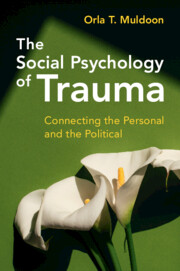The Social Psychology of Trauma
Many of us have been affected by trauma and struggle to manage our health and well-being. The social psychological approach to health highlights how social and cultural forces, as much as individual ones, are central to how we experience and cope with adversity. This book integrates psychology, politics and medicine to offer a new understanding that speaks to the causes and consequences of traumatic experiences. Connecting the personal with the political, Orla T. Muldoon details the evidence that traumatic experiences can, under certain conditions, impact people’s political positions and appetite for social change. This perspective reveals trauma as a socially situated phenomenon linked to power and privilege or disempowerment and disadvantage. The discussion will interest those affected by trauma and those supporting them, as well as students, researchers, practitioners and policy makers in social psychology, health and clinical psychology and political science. This title is available as Open Access on Cambridge Core.
Orla T. Muldoon is Professor of Psychology at the University of Limerick, Ireland, where she has lived on both sides of the border. She is currently editor-in-chief of Political Psychology and holds a prestigious European Research Council Advanced Grant. She has written numerous peer-reviewed publications on trauma, health, and political attitudes, and she makes regular media and policy contributions, including as a columnist with The Irish Times.

